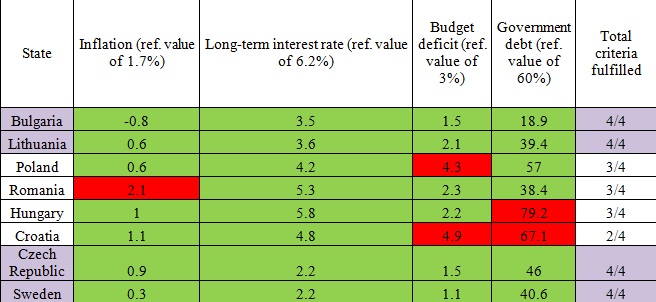BULGARIA COVERS THE FOUR NUMERICAL BENCHMARKS FOR EURO AREA MEMBERSHIP
05.06.2014
Bulgaria covers the four numerical benchmarks for euro area membership. This is mentioned in the Convergence Reports of the European Central Bank (ECB) and the European Commission (EC) released on 4 June 2014. These are the second reports of the Commission and ECB of this kind after the ones released in 2012 confirming that Bulgaria fulfils all the numeric benchmarks for membership in the euro area.
Together with Lithuania, the Czech Republic and Sweden, Bulgaria is one of the members outside the euro area that fulfil all numeric membership benchmarks. According to the experts of both institutions, our country fulfils the criterion on price stability with an inflation rate during the 12 months to May 2014 of -0.8%, well below the reference value of 1.7 per cent. The deficit-to-GDP ratio is 1.5% in 2013, well below the reference value of 3%. Bulgaria's long-term interest rate in the period May 2013 - April 2014 is 3.5% on average, i.e. below the reference value of 6.2% according to the long-term interest rate convergence criterion. The gross government debt/GDP ratio is 18.9%, well below the reference value of 60%. Poland, Romania, Hungary and Croatia do not fulfil one or two criteria each. These reports admit Lithuania to the euro area as from 1 January 2015, with Sweden not identifying the adoption of the single currency as a target ever since the launch of the euro.

The 2010 reports state that Bulgaria fulfils three of the four numeric benchmarks, the only exception being the government debt-to-GDP ratio. The 2008 Convergence Reports find that three of the four indicators of Bulgaria cover the Maastricht criteria, i.e. budget deficit, government debt-to-GDP ratio and long-term interest rate. The condition for covering the exchange rate criterion is ERM II participation and Bulgaria therefore does not fulfil it.